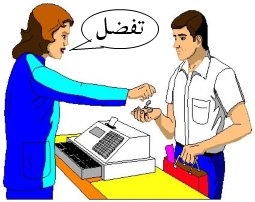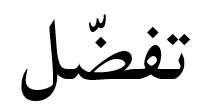The Arabic word تفضّل tafaDDal is a commonly-used and highly-versatile expression.
Depending on context, it:
1. Expresses an invitation to do something:

تفضل اجلس واشرب شاي tafaDDal idjlis wa shrab shay – please, sit down and drink some tea.
تفضل إلى الدكان tafaDDal ila d-dukkaan – please, take a look at my shop.
تفضل إلى بيتي tafaDDal ila beiti – please, come to my house.
2. Expresses approval/giving permission of a planned action:
A: ممكن اشوف المهمول الذهبي؟ mumkin ashuf al-mahmool al-dhahabi? – may I see the golden mobile phone?
B: تفضّل tafaDDal! – yes, please go ahead. / yes, please help yourself.
3. When letting someone else pass first (e.g. through a door).
4. Used when presenting or handing over something:

“Here’s your change.”
تفضل هذه هدية صغيرة لك tafaDDal, hadhihi hadeeya sagheera lak – here, a small present for you
Derivation
tafaDDal derives from the Arabic root faDl, which means “grace” or “kindness”. The form tafaDDala (tafa33ala) takes on the meaning “to be so gracious, to be so kind”. Grammatically speaking, tafaDDal is the imperative form of this word, i.e. “be so kind!, be so gracious!”. If addressed to a woman it needs to be changed to tafaDDali. If addressed to a group it changes to tafaDDalu.
The Arabic for please – من فضلك min faDlik – derives from the same root and literally means “from your kindness”, i.e. if you comply with my request it is from your kindness that you are doing so.
Pronunciation

The word tafaDDal contains a sound that is sometimes difficult for non-native speakers to pronounce, i.e. the Daad. Whatsmore, double emphasis is placed on this letter in the word.
In essence, the D sound is a darker, more emphatic version of our regular d sound. The main trick to get this right is to realize that the a that immediately follows this letter needs to change to sound a little darker (i.e. not so open as a normal a sound). You can listen to the Daad sound a few times here to get a feeling for the pronunciation.
An interesting thing to note is that the Daad often changes to more of a z sound in many dialects; however, I’ve never heard a speaker do this in the word tafaDDal.





I really like this site!!! Could you please tell me, how to said”nice to meet you” and how you answer it? I think it is something like “tasharrafna” ? I desperately need it for my examen next week.
kindly regards Anette Madsen, Denmark
Hi Anette. Yes, you’re right, in Arabic “nice to meet you” is most commonly expressed by saying تشرّفنا (tasharrafna). It literally means “we have been honoured”, with the implication that “we have been honoured by (meeting) you”. The English “it’s an honour” is somewhat similar. The “we” is used even when you are on your own meeting someone – it’s a somewhat archaic construction.
As for what to respond, there are a few options:
One can simply say تشرّفنا (tasharrafna) oneself in response, or تشرفنا بك (tasharrafna bik) “we were honoured by you” (addressing one person) / تشرفنا بكم (tasharrafna bikum) when addressing a group.
Alternatively, you could say الشرف لي (ash-sharrafu li), which means “the honour is mine”, i.e. you’re the one being honoured by meeting them.
Good luck with your exam!
Thanks it really good.
As salaam alaykum, my new tutor!
I am in my first week of my first Arabic class, and a (take home, open book) quiz asks what your response to Tafaddali will be. I have not been able to find it in the class materials so went to the ever-popular interwebs for help.
Would the proper response just be “shukran?” I know you don’t have my vocabulary list to draw from, but it’s rather limited.
Shukran.
Niloufar
Hi Niloufar. Yes, you’re right: شكرا (shukran) would be a perfectly appropriate response to تفضل (tafaDDal).
Hope you’re enjoying your Arabic classes.
Greetings.
Ref the post by ArabicGenie (pasted for reference below):
ArabicGenie on June 6, 2013 at 10:24 am said:
Hi, Niloufar. Yes, you’re right: شكرا (shukran) would be a perfectly appropriate response to تفضل (tafaDDal).
——————-
A prevalent and formal reply (somewhat akin to English: You’re welcome) to “thanks” (shukran = شكرا) common in Saudi Arabia and neighboring Gulf Arab states is
Laa shukr 3la waajib = don’t thank me for doing my duty (as your host, etc.)
لا شكر على واجب
While there is also a more-informal reply of “3fwaan,” that utterance is lesser0used, as it suggests that the speaker is uncultured and unappreciative – or akin to the pejorative Russian adjective “nyekulturnii.”
Hope this helps. today is Thursday March 5, 2014.
Regards,
Stephen H. Franke
San Pedro (Los Angeles Waterfront Area), California
Je veux prendre des cours avec vous
“Tafaddhal” has an answer in “akramni/tkrmni” . Can somebody correct me please?!
Thanks.
Assalamu alaykum warahmatullah wabarakatuh. Please i would like to learn Arabic and the fluent in speaking. I can write and read Arabic but I don’t know the meaning. I need a tutor please.
Shukran.
I am learning Swahili and I see so many similarities! Both beautiful languages. In Swahili please is tafadhali. Sounds like it is a derivative.
.